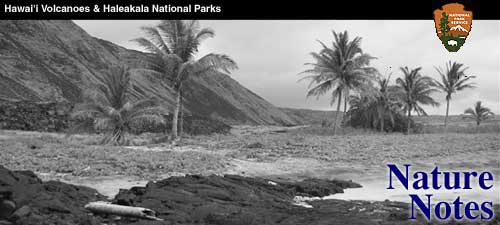

|
|
HAWAII NATURE NOTES
HAWAIIAN WORDS AND PLACE NAMES THE HAMZA. During the centuries, changes occur in dialects. Hawaiian is one of the dialects of the Polynesian language. A striking change in Hawaiian is the dropping of the letter k that once appeared in some words. But instead of complete discard of the sound, its former existence is revealed as a little catch in the throat, called a glottal stop. This is represented in print by a mark (') called hamza. The omission of this mark can spell a word of entirely different meaning. Yet, without explanation, the hamza can be more bewildering than helpful to those unfamiliar with Hawaiian. Its use in this book therefore has been limited to this section and to the section on plants, because it is needed if correct pronunciation is attempted. And who fails to want to try Hawaiian on his tongue!
AHU—Pile, cairn, altar, shrine. Often a small or large pile of stones erected as a trailmark or landmark. Ahu were sometimes put up by passing parties as monuments or evidence that they had been there, even as mountain climbers do to this day. To be assured of a safe journey, an ahu of three stones was made as tribute to the god of the locality. ALII—Ali'i, chief, chiefess, sovereign, ruler. One of the upper class. HALALII—Hala-li'i, fun-making, from the name of a traditional chief of Ni'ihau. HALEAKALA—Hale-a-ka-la is usually interpreted as "house of the sun," a simple translation of the Hawaiian name given us for the mountain. It assumes vague reference to the Maui legend. An old explanation converted the translation to "house built by the sun." Rev. A. O. Forbes26 says that the name is a corruption of Alehe-ka-la "snarer of the sun," in reference to Maui's deeds. Still another version would have it Ahale-ka-la, to be interpreted as "rays of the sun."
HALEMAUU—Hale mau'u is grass hut; hale ma'u'u signifies damp house. HANA—Bay or valley, when used in a place name. HANAKAUHI—Hana-ka-uhi, the mist-maker; yam valley. HAOLE—A foreigner, one of foreign extraction; today, usually in reference to a Caucasian; adj., foreign. HEIAU—Pre-christian place of worship, hence, usually translated temple. This was often a stone platform or an earth terrace. HOLUA—A course used for the ancient royal sport of sliding down steep slopes; also the sled itself. HONOKAHUA—Hono-ka-hua, joined foundation. IAO—'I-ao, high; into the clouds. KAHULUI—Ka-hului, a sea for drag-net fishing. KALAHAKU—The proclamation of the Lord. KALAPAWILI—Ka-lapa-wili, winding or twisting ridge. KALUAAWA—Ka-lua-'awa, the 'awa pit. 'Awa or kawa is the well-known traditional drink of Polynesia made from Piper methysticum. KALUAIKI—Ka-lua-iki, small pit or crater. KALUANUI—Ka-lua-nui, large pit or crater. KALUA O KA OO—Ka lua o ka 'o'o, the pit of the 'o'o. The 'o'o, now extinct, was an endemic, black, nectar-sipping bird. It had tufts of yellow feathers under each wing and at the base of the tail, which were used in featherwork. KALUA O UMI—Umi's Cave. KAMOALII—Ka moa li'i, the little chicken. KA MOA O PELE—Pele's chickens or chicken coop. KANAKA—(Haw. pl. kanaka; Eng. pl. kanakas) human being, person, man. KAPA—Tapa, a cloth made from the bark of mamaki or wauke; formerly, clothes of any kind; bedclothes. KAPALAOA—Ka palaoa, the palaoa was a highly-prized pendant of whale-tooth ivory, a symbol of royalty over the theft of which wars were waged. KAUPO—Kau po, to land at night. A variety of banana is given this name, probably after the place name. KAWILINAU—Ka wili nau, literally, the twist of pain. This is the Hawaiian place name for Bottomless Pit. KEAHUOKAHOLO—Ke ahu o ka holo, a heap resulting from a landslide. KEANAE—Ke 'anae, the large mullet. KEONEHEEHEE—Ke one he'ehe'e, the sliding sands. KIHEI—Shoulder covering; a rectangular fine mat or tapa used as a mantle. KIPAHULU—Worn-out soil. KOLEKOLE—Bright red, blood red. KOOLAU—Ko'olau, windward side. KUIKI—Ku iki, a moment's stop, a short halt. KUMUILIAHI—Kumu 'iliahi, sandalwood trunk. LAUULU—Lau 'ulu, leaf of breadfruit tree. LELEIWI—Carved figure on the bowsprit of a canoe or ship. LILINOI—Goddess of Haleakala. MAKAWAO—Maka wao, forest region. MAUI—Contrary to popular belief and despite the similar spelling, the island does not bear the name of the demigod. The name of the island is pronounced mow-ee. This almost rhymes with an enthusiastic "WOWIE!" especially as a Virginian might pronounce it. The au must be treated in the fashion for Hawaiian dipthongs, that is, the crisp vowels are more loosely connected than in the English, and a slight accent is imposed on the leading one. The demigod's name has three syllables, with accent on the second, i.e., the u. Thus, Ma-u'-i. MAUNA—Mountain. MAUNA HINA—Gray mountain. MOI—Mo'i (A 19th Century word), King, queen, soverign. NAMANA O KE AKUA—Na mana o ke akua, the miraculous power, mana, of Deity, gods, or spirits. NA PIKO HANA—The hiding place for navel cords. NIANIAU—Ni'ani'au, the sword fern. OILI PUU—'O'ili pu'u, hill appearing, hill shot out. PALIKU—Pali ku, upright cliff. POHAKU PALAHA—Broad stone; wide stone. PUKALANI—Puka lani, heavenly entrance, chief's doorway. PUU—Pu'u, hill. This is contracted in some names to pu. PUU HELE—Pu'u hele, moving hill. PUU KAUAUA—Pu'u ka uaua, the stubborn hill; the tough hill. PUU KUMU—Pu'u kumu, stump hill. PUU MAILE—Maile is a fragrant vine, Alyxia oliviformis, used and loved like the laurel of Europe. PUU MANEONEO—Pu'u mane'one'o, itching hill. Maneoneo means barren. PUU NAUE—Pu'u naue, trembling hill; loose or insecure hill. PUU NOLE—Grumbling hill. WAIALE—Wai'ale, rippling water. WAI ANAPANAPA—Wai 'anapanapa, sparkling water. WAIHOI—Wai ho'i, water that returned. WAIKAU—Wai kau, water on a high place. WAIKEKEEHIA—Keke'ehia means to twist and wind like a rivulet or stream, hence, the name is interpreted as crooked waters. WAILUKU—Wai luku, water of destruction. |
| <<< Previous | > Cover < | Next >>> |
nature_notes/havo/vol6-59q.htm
24-Mar-2006